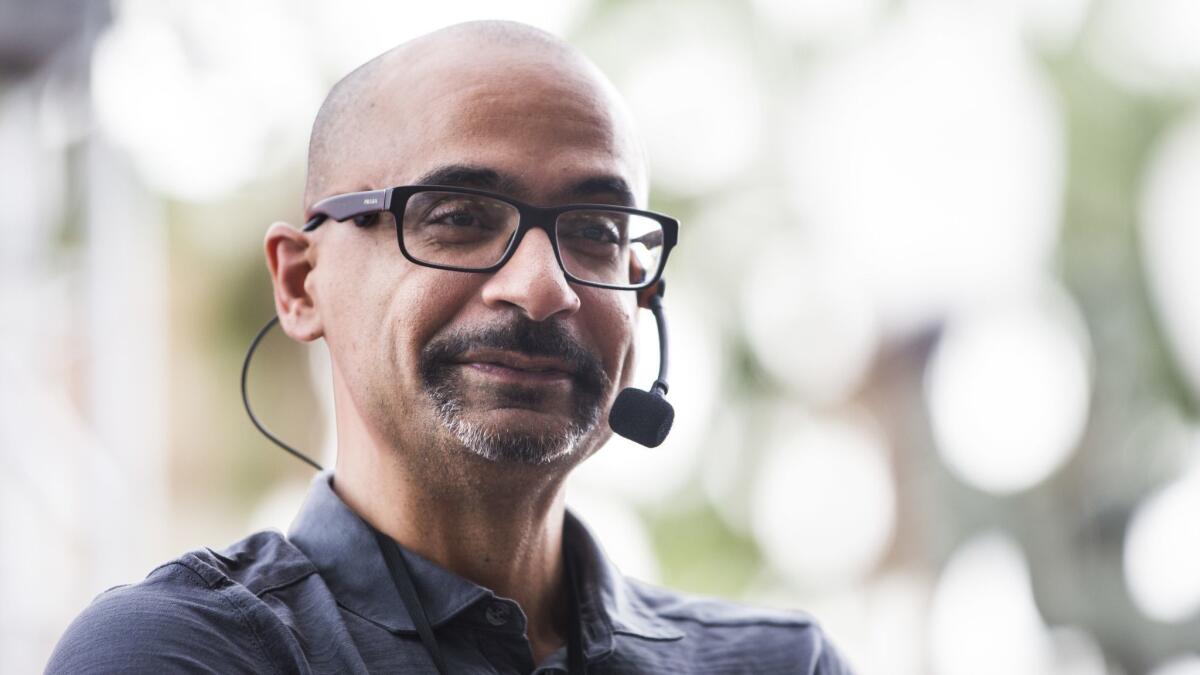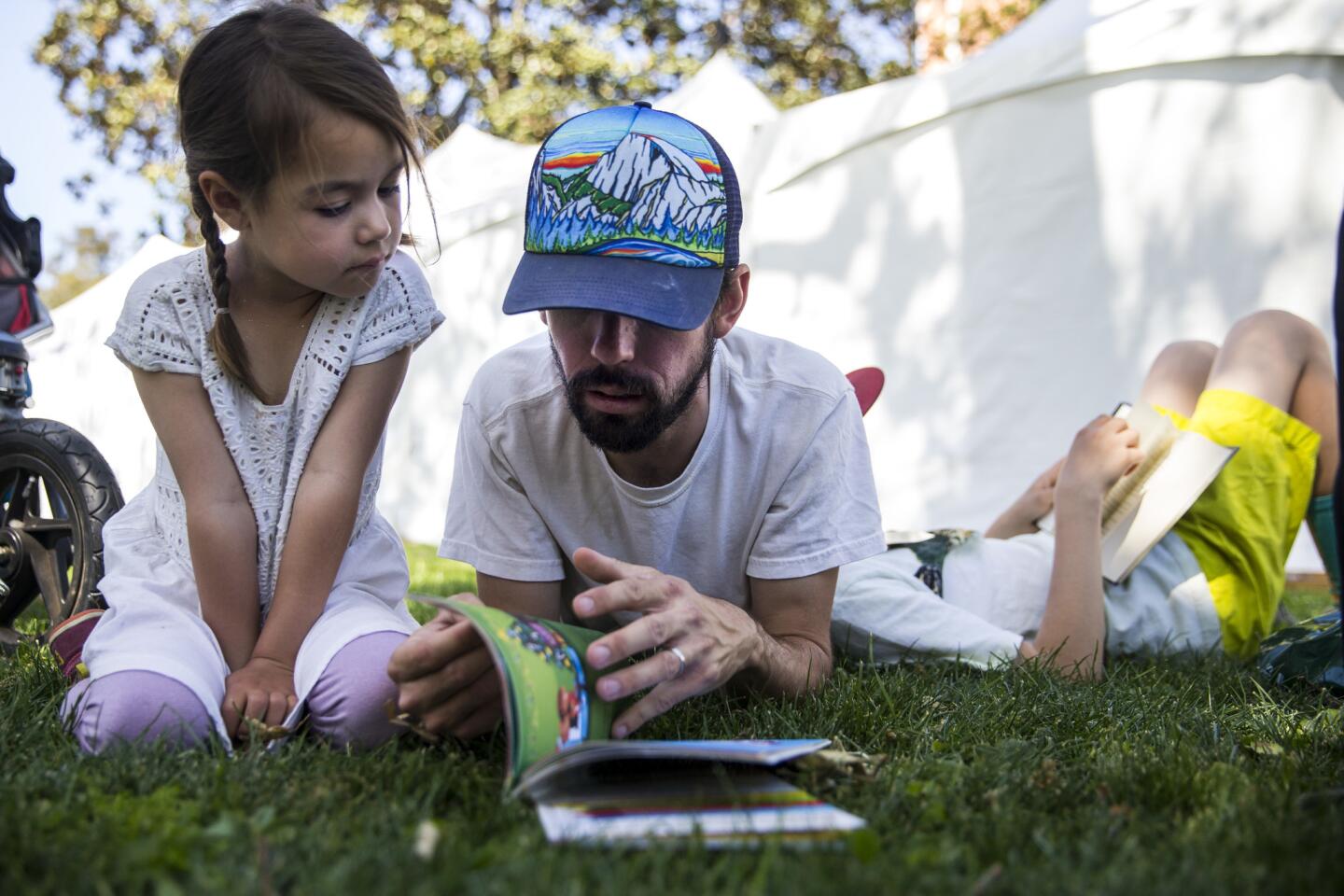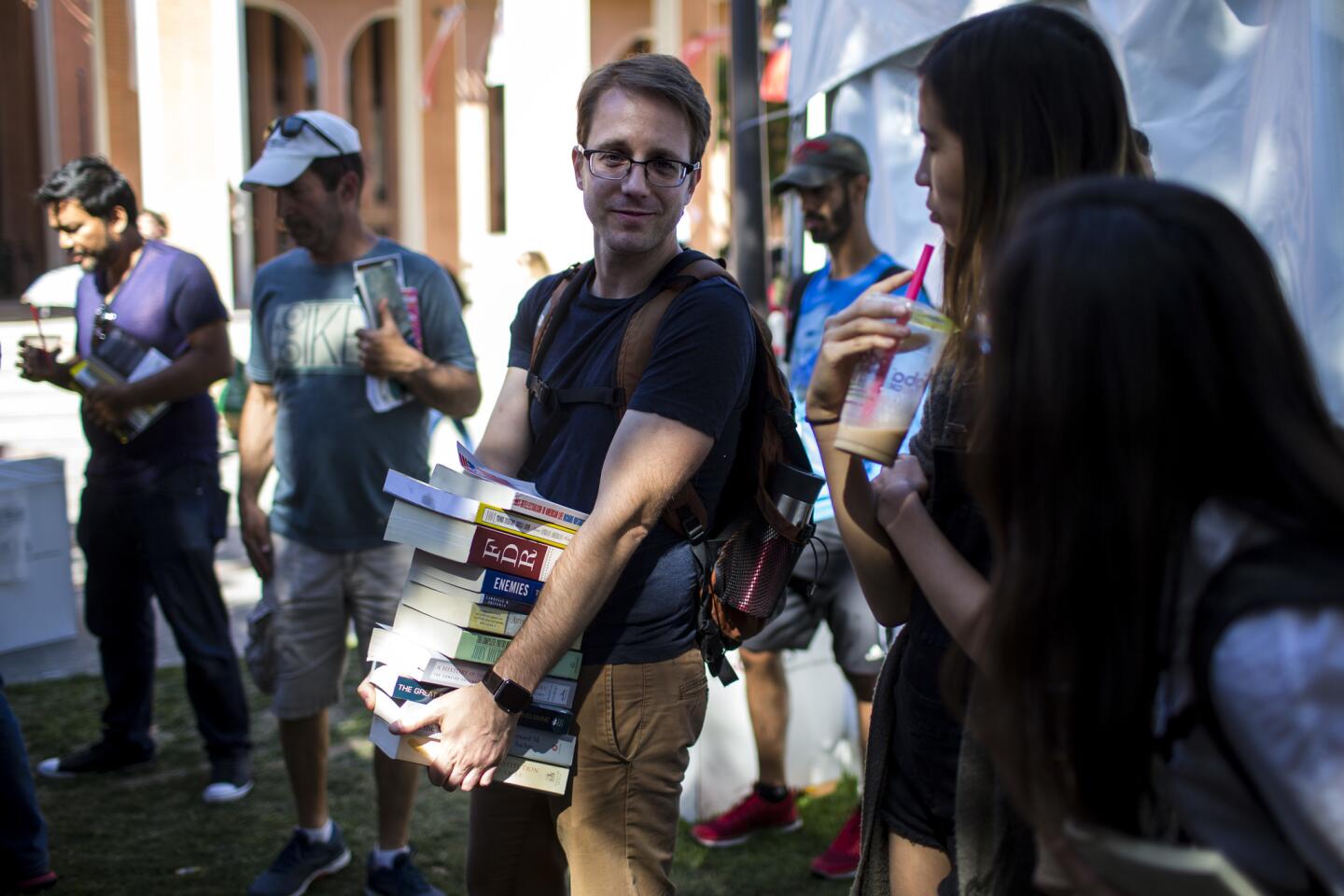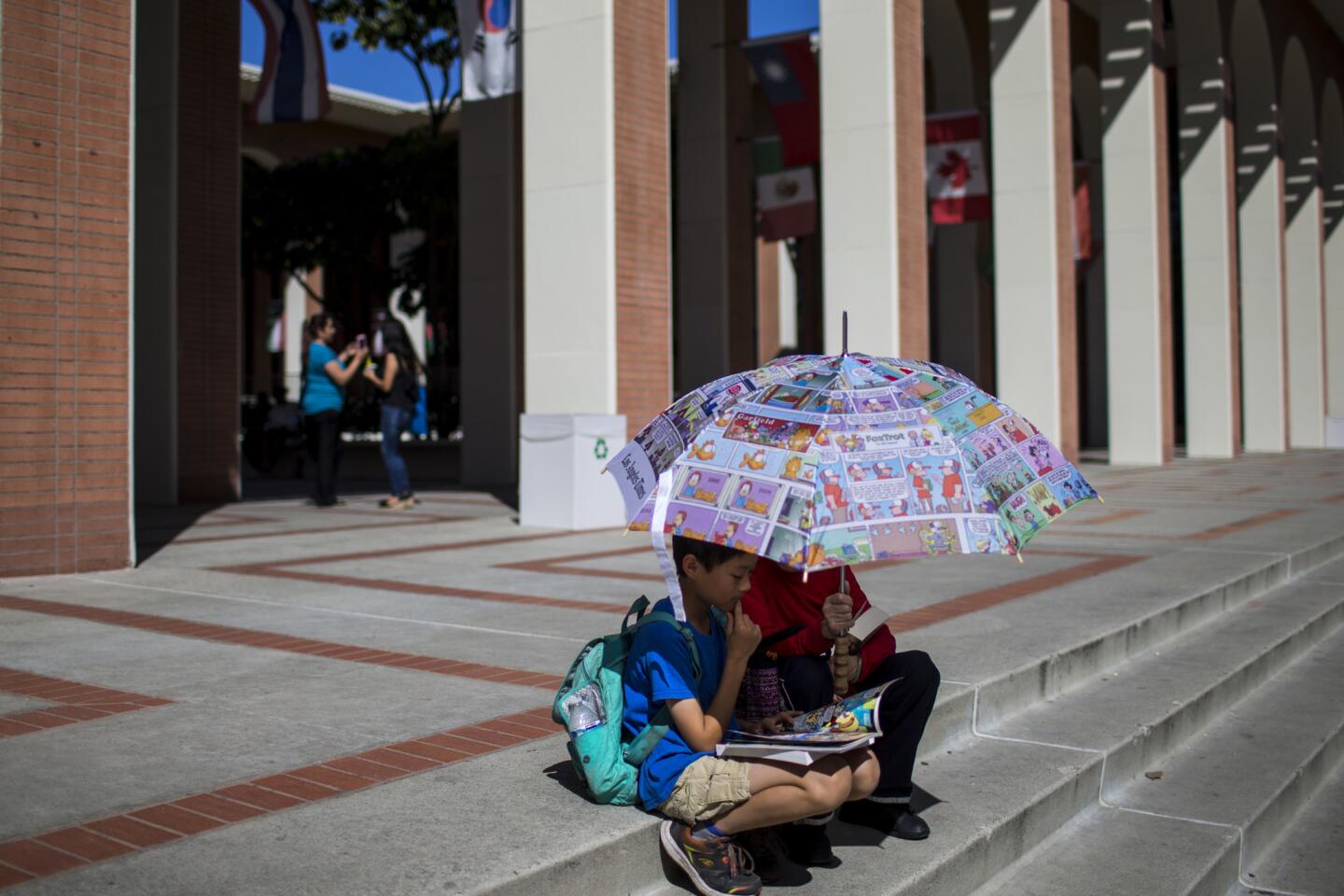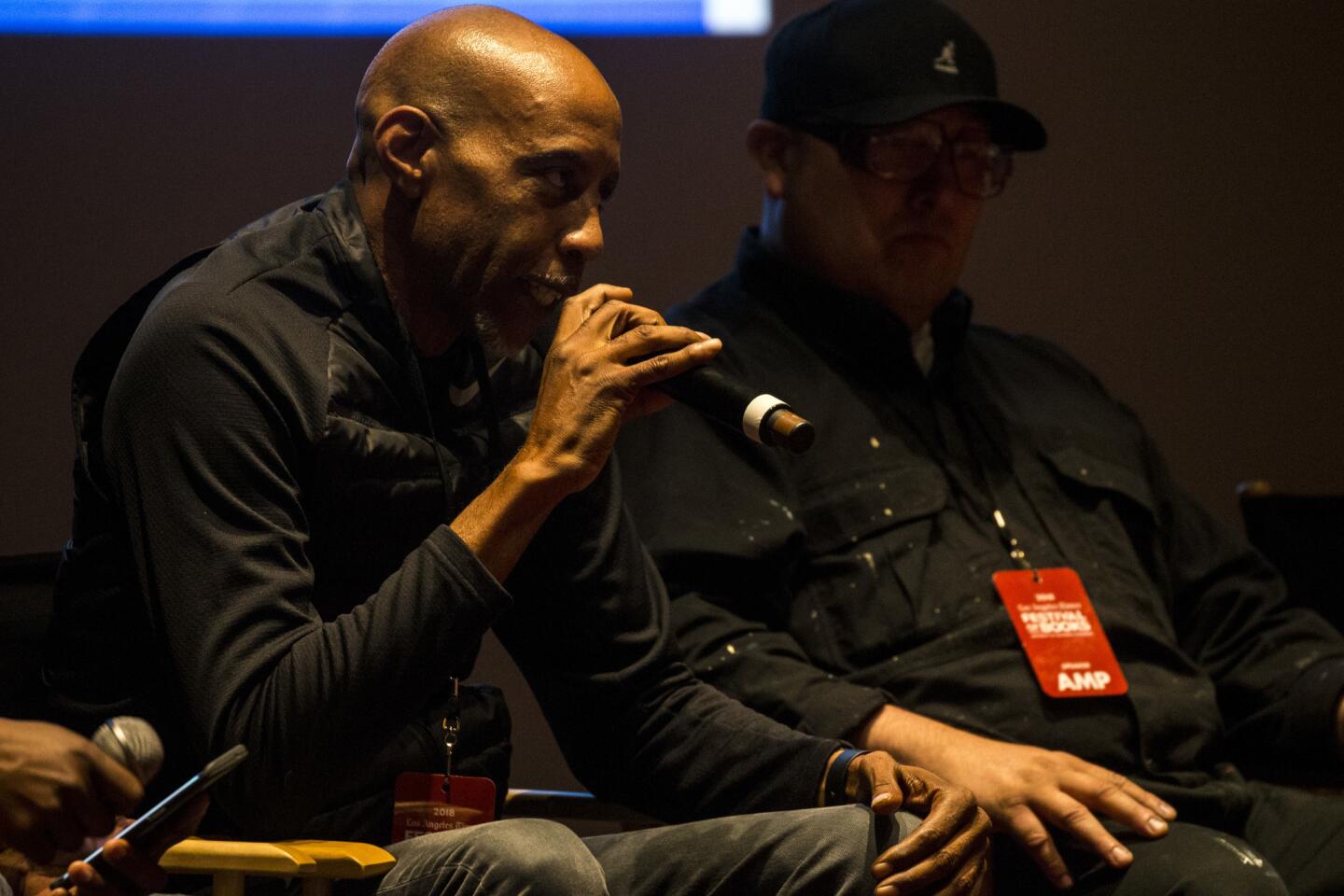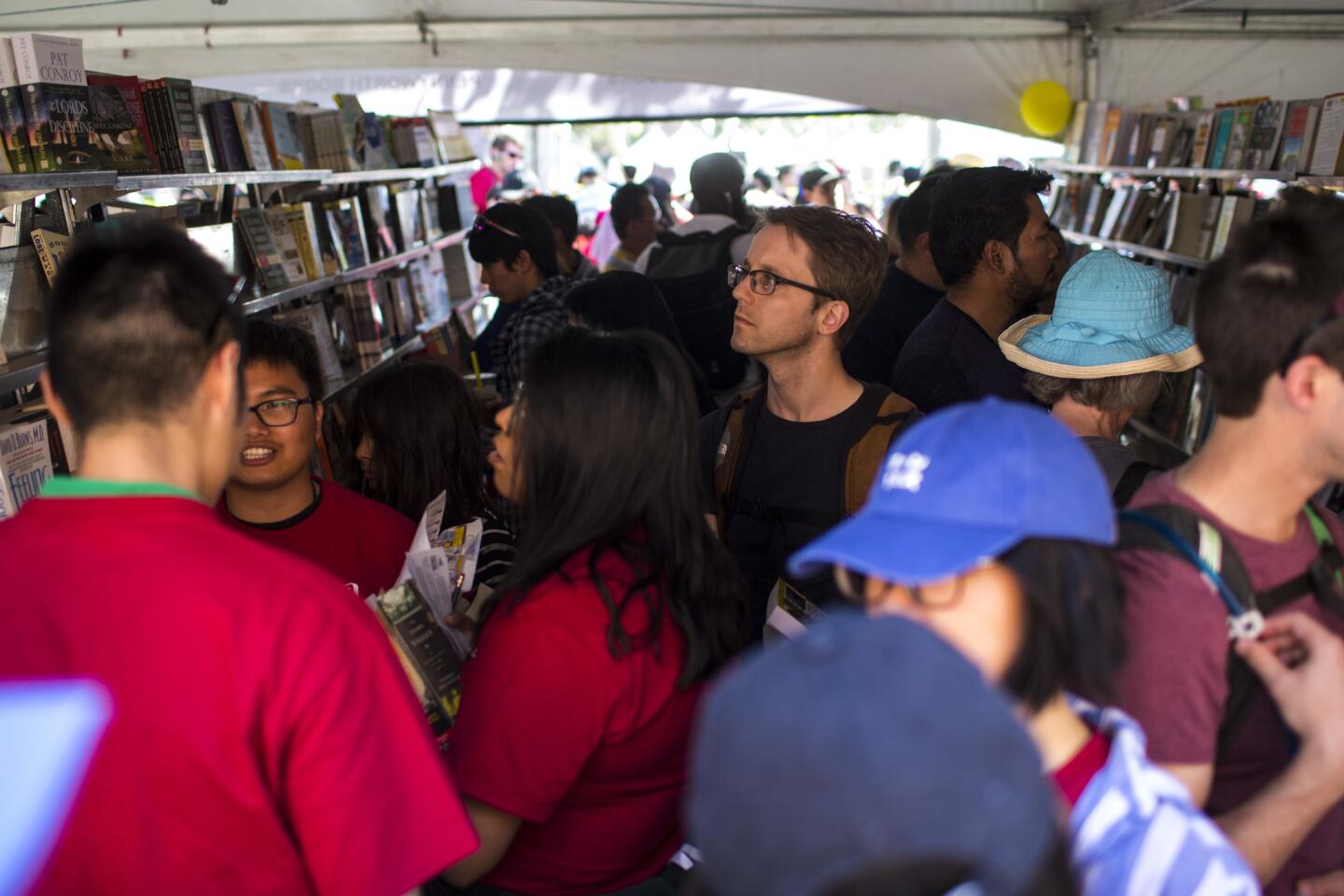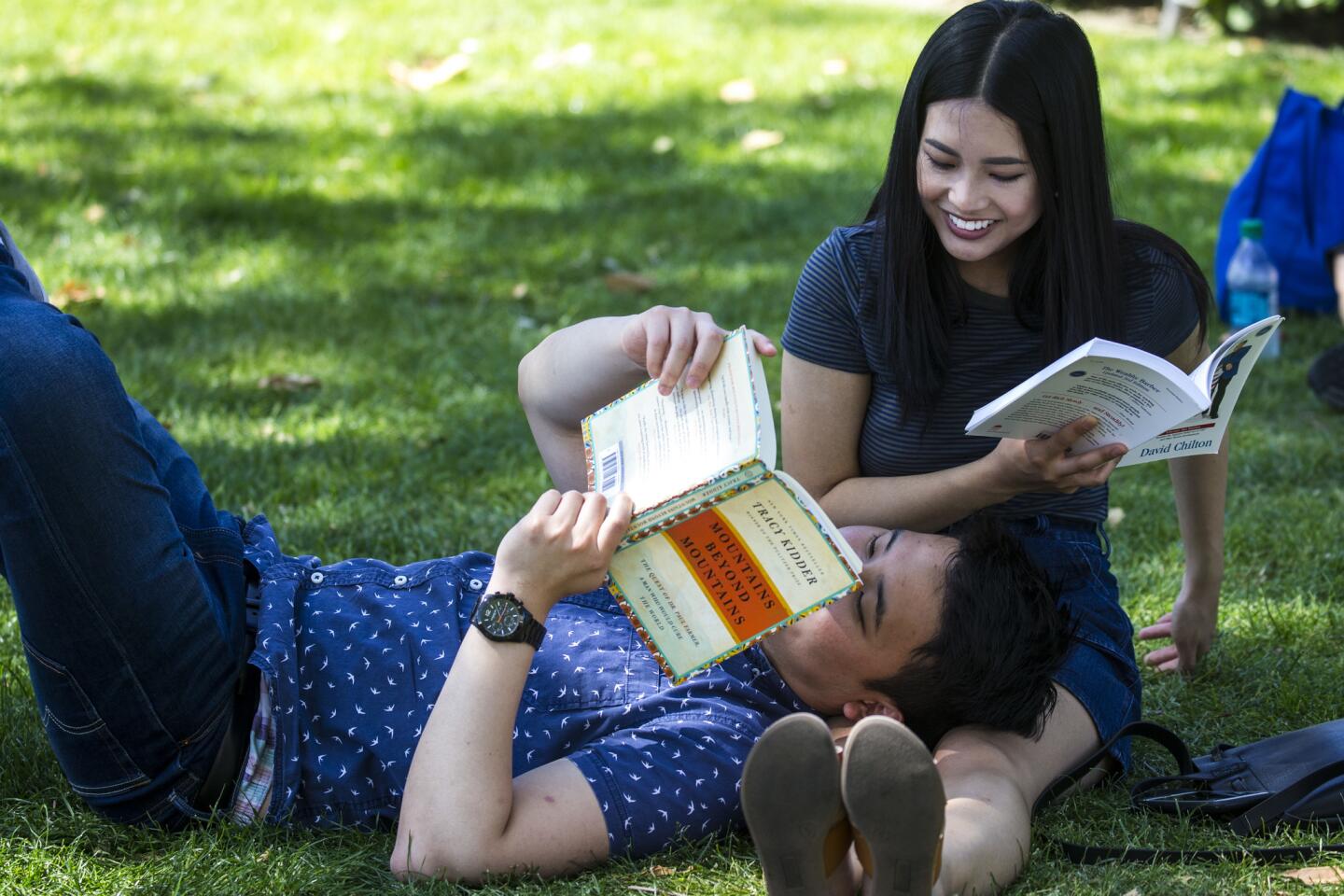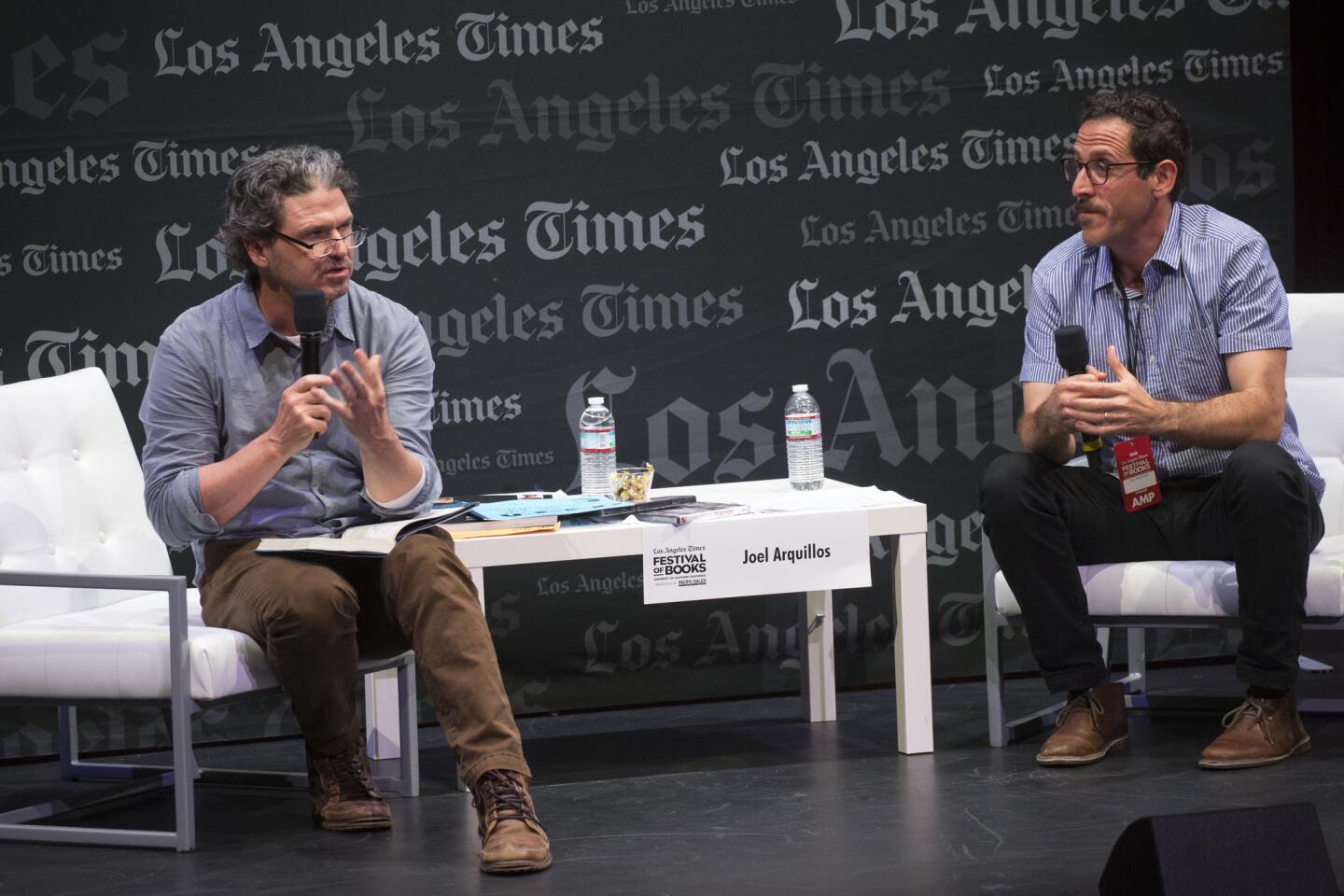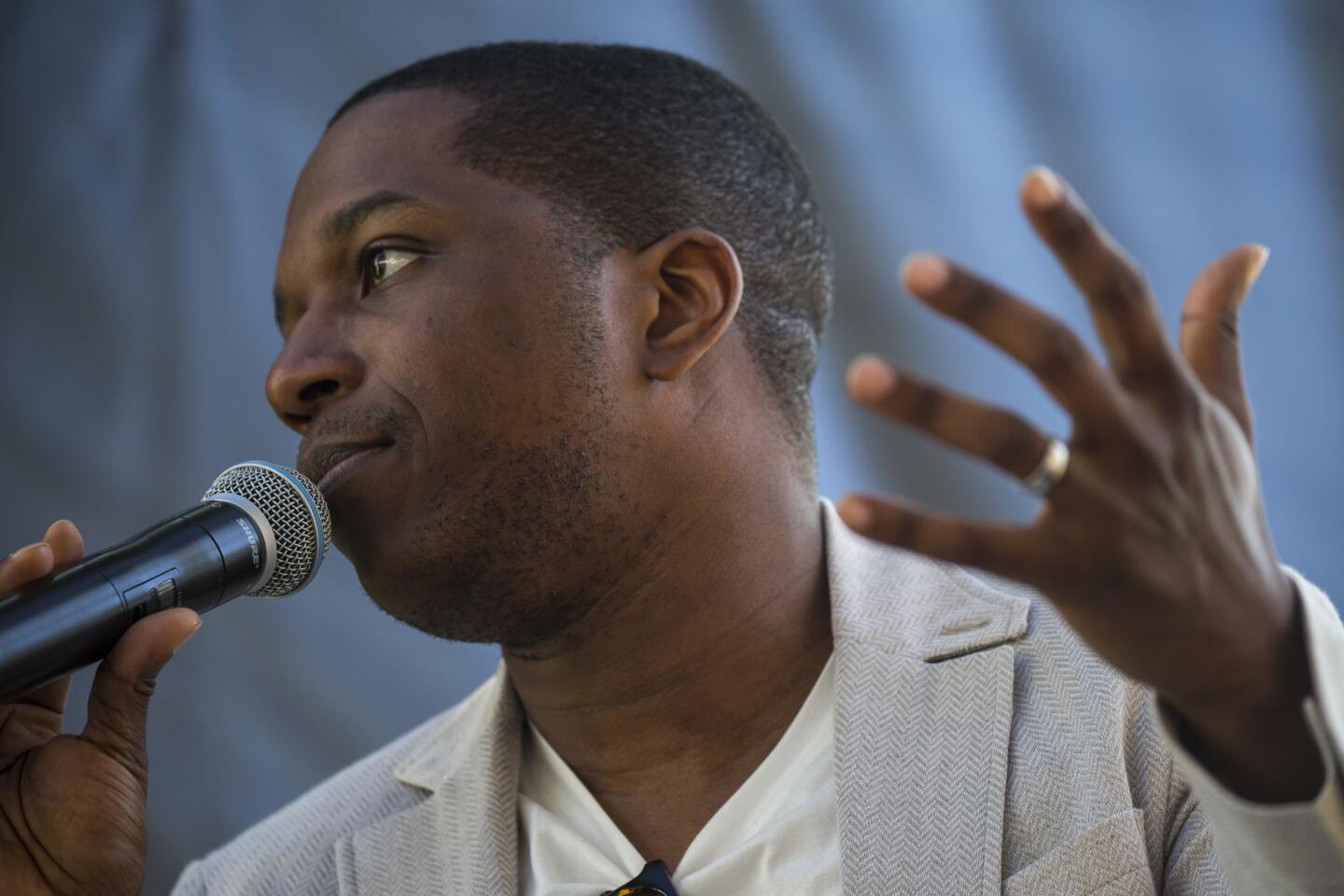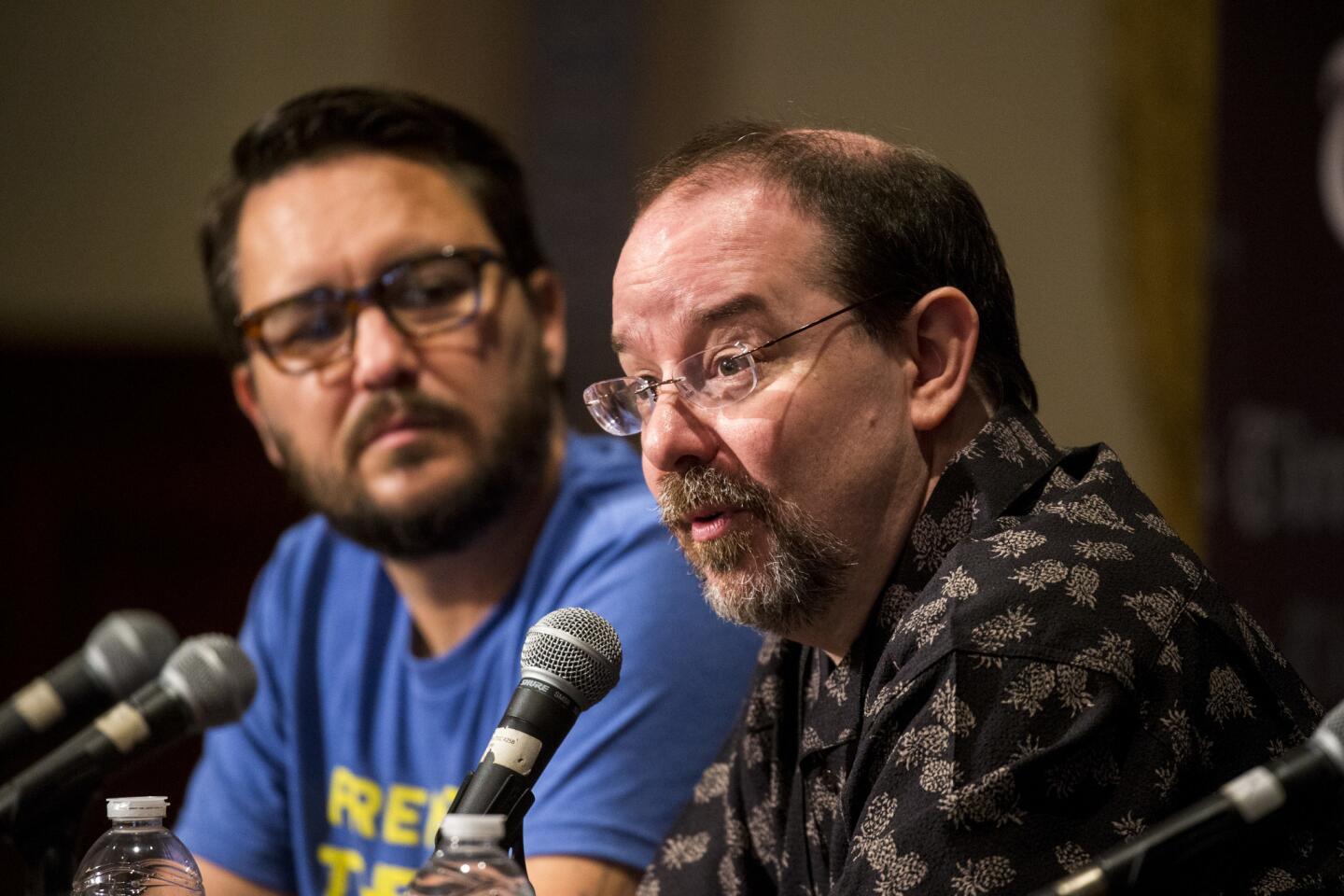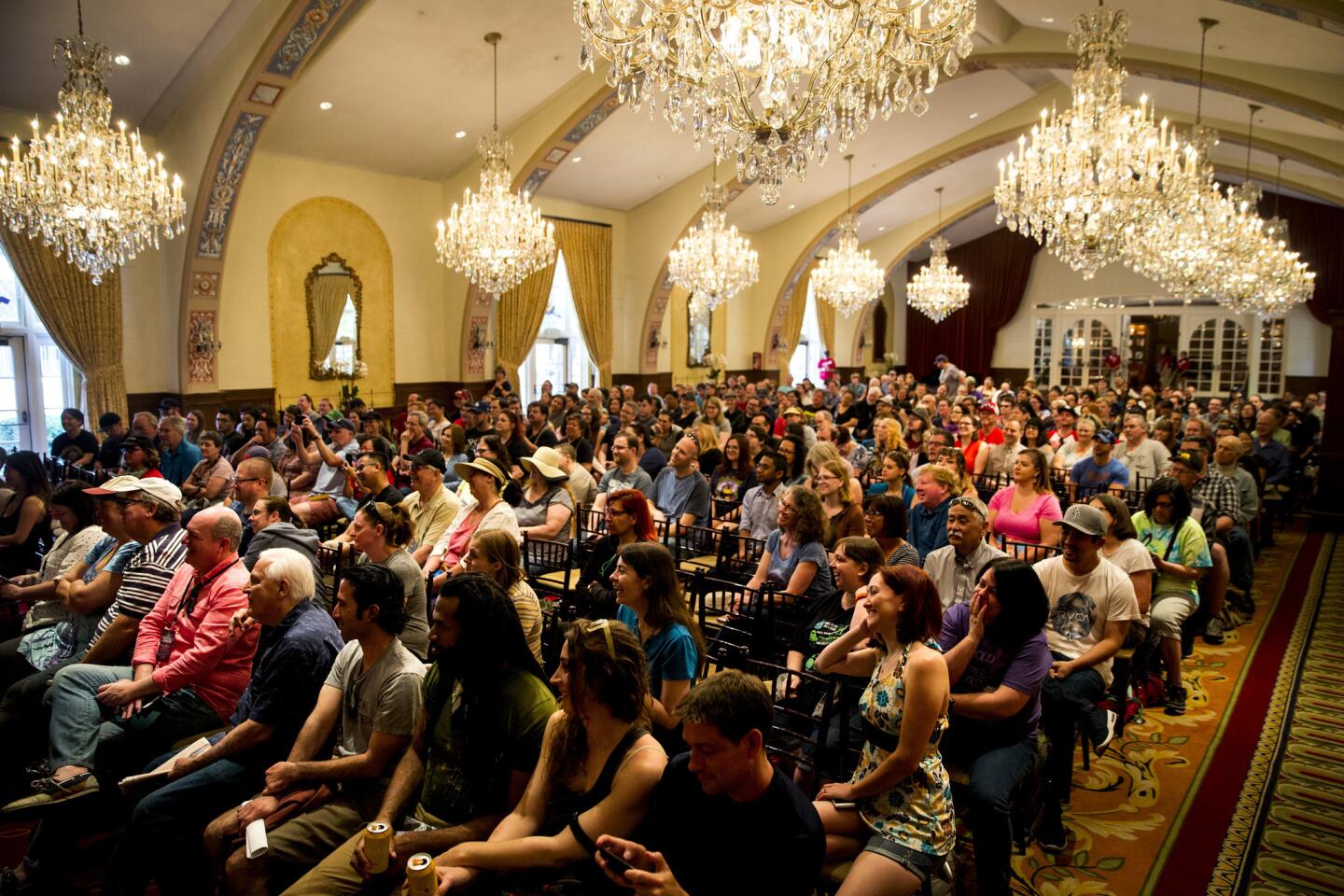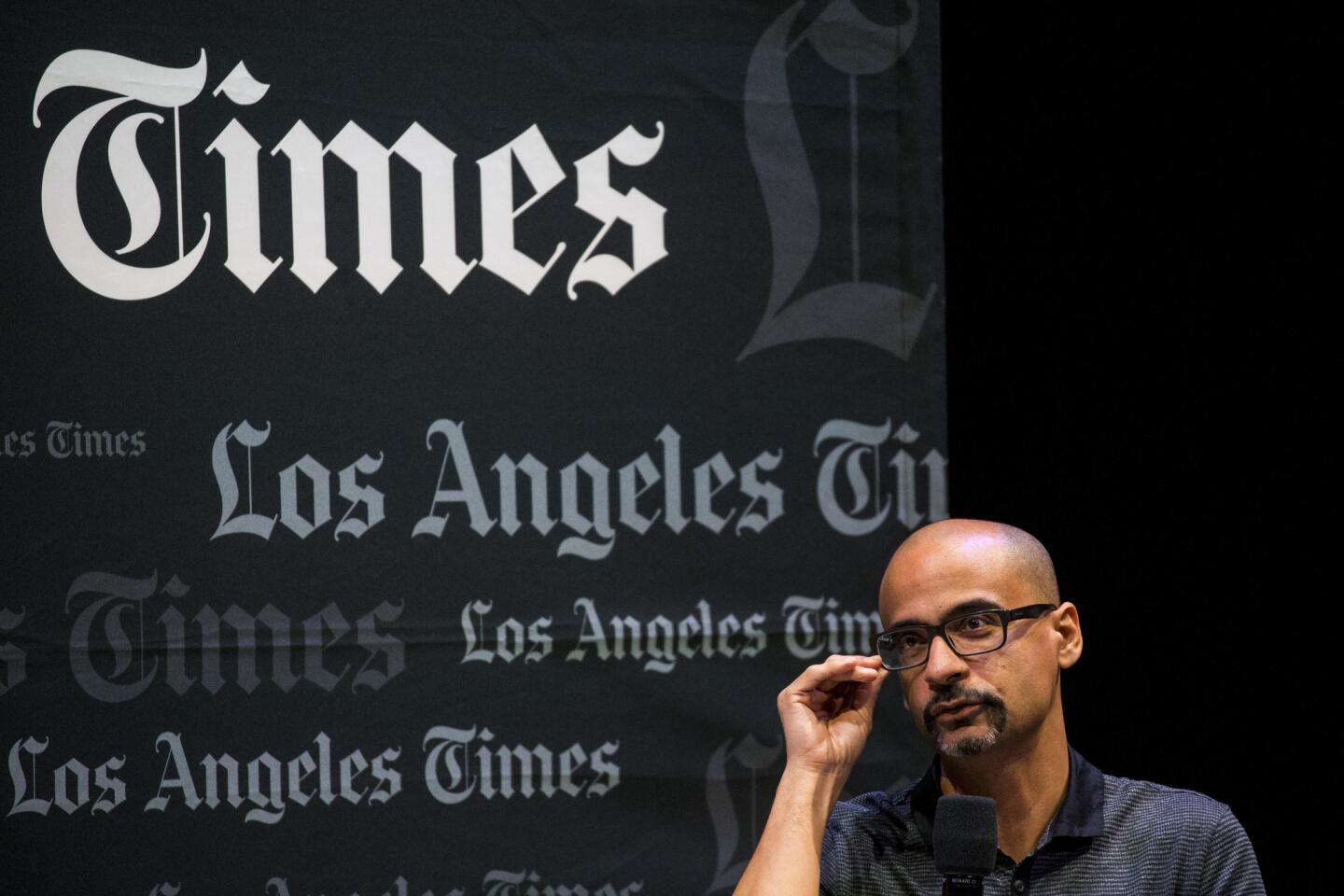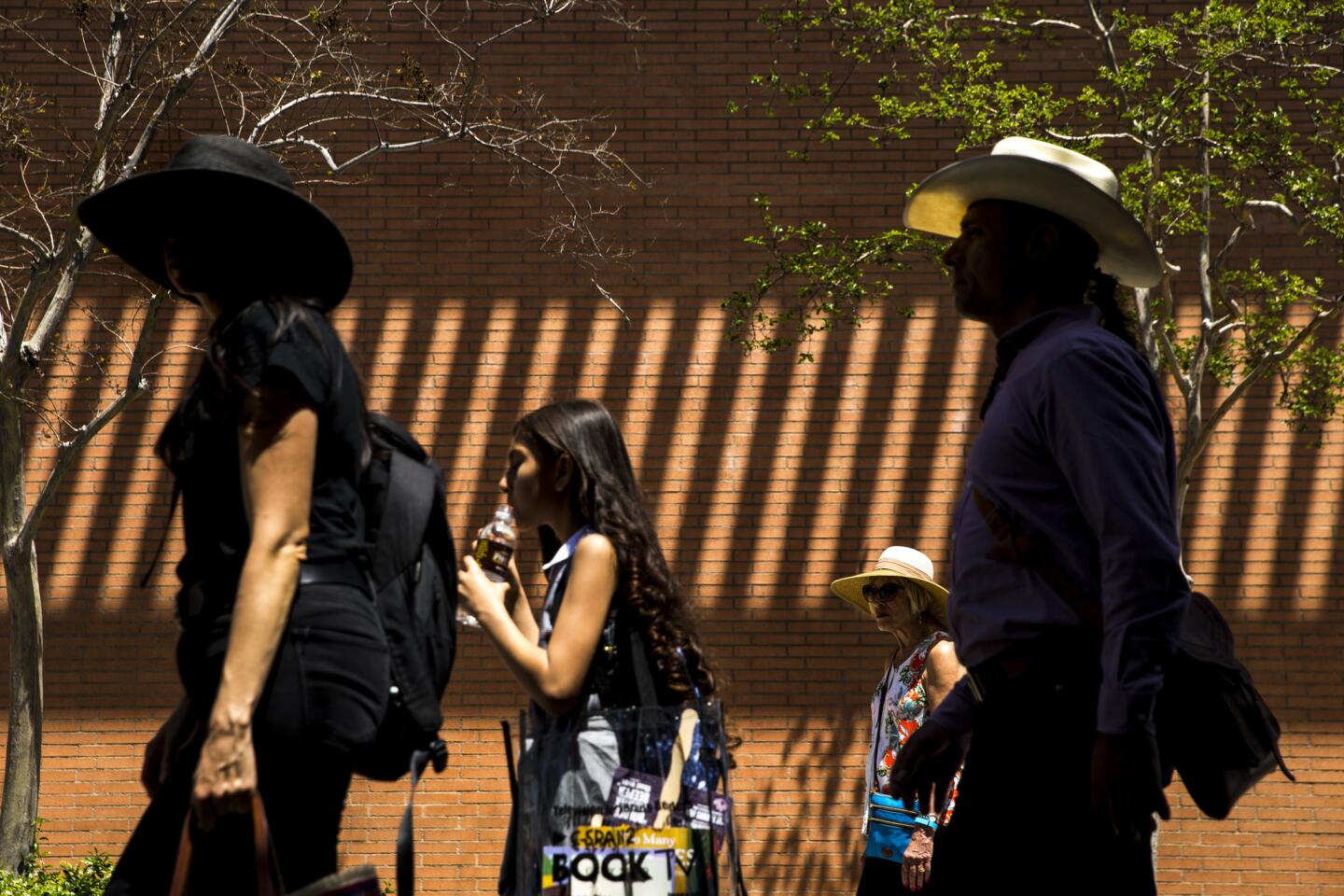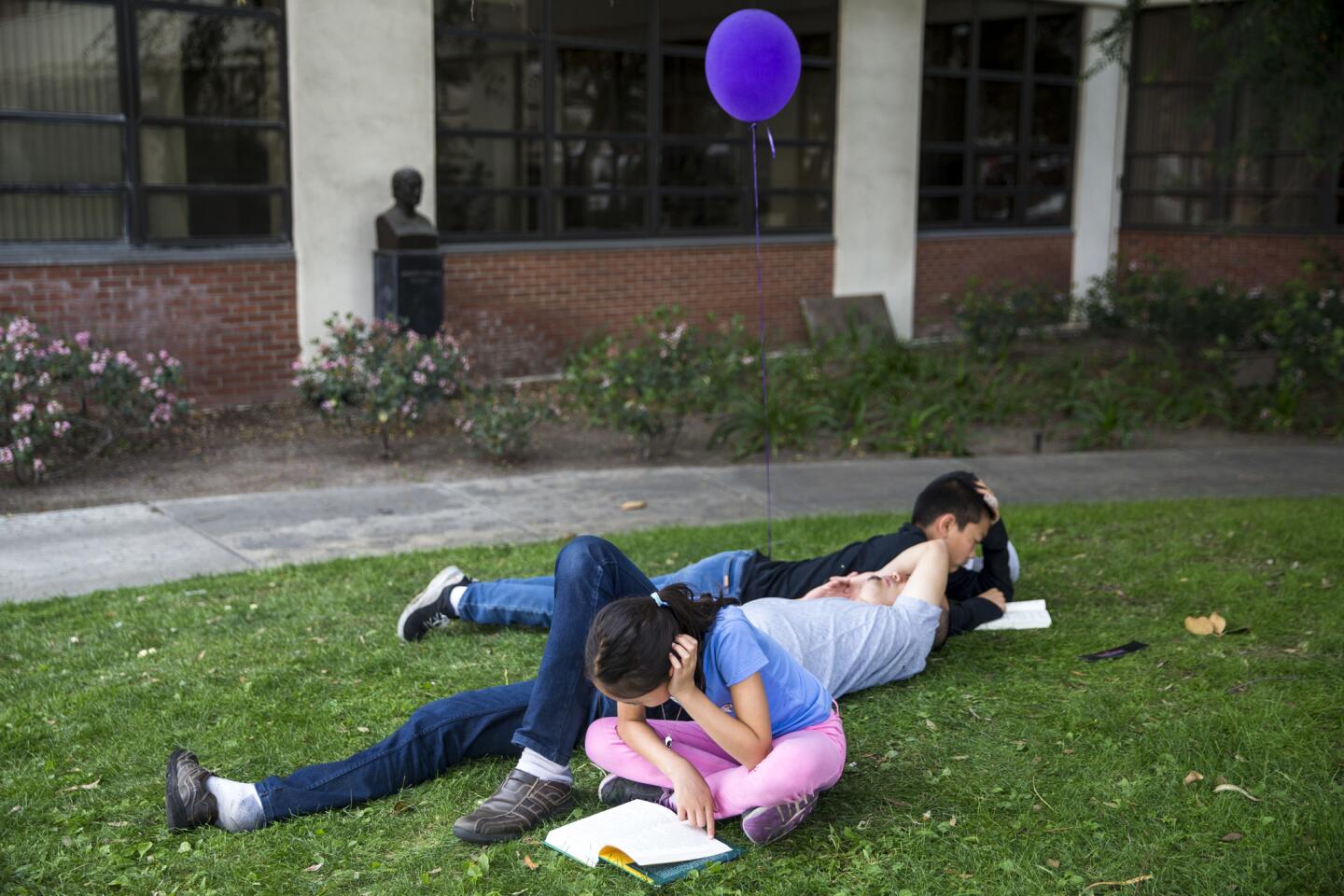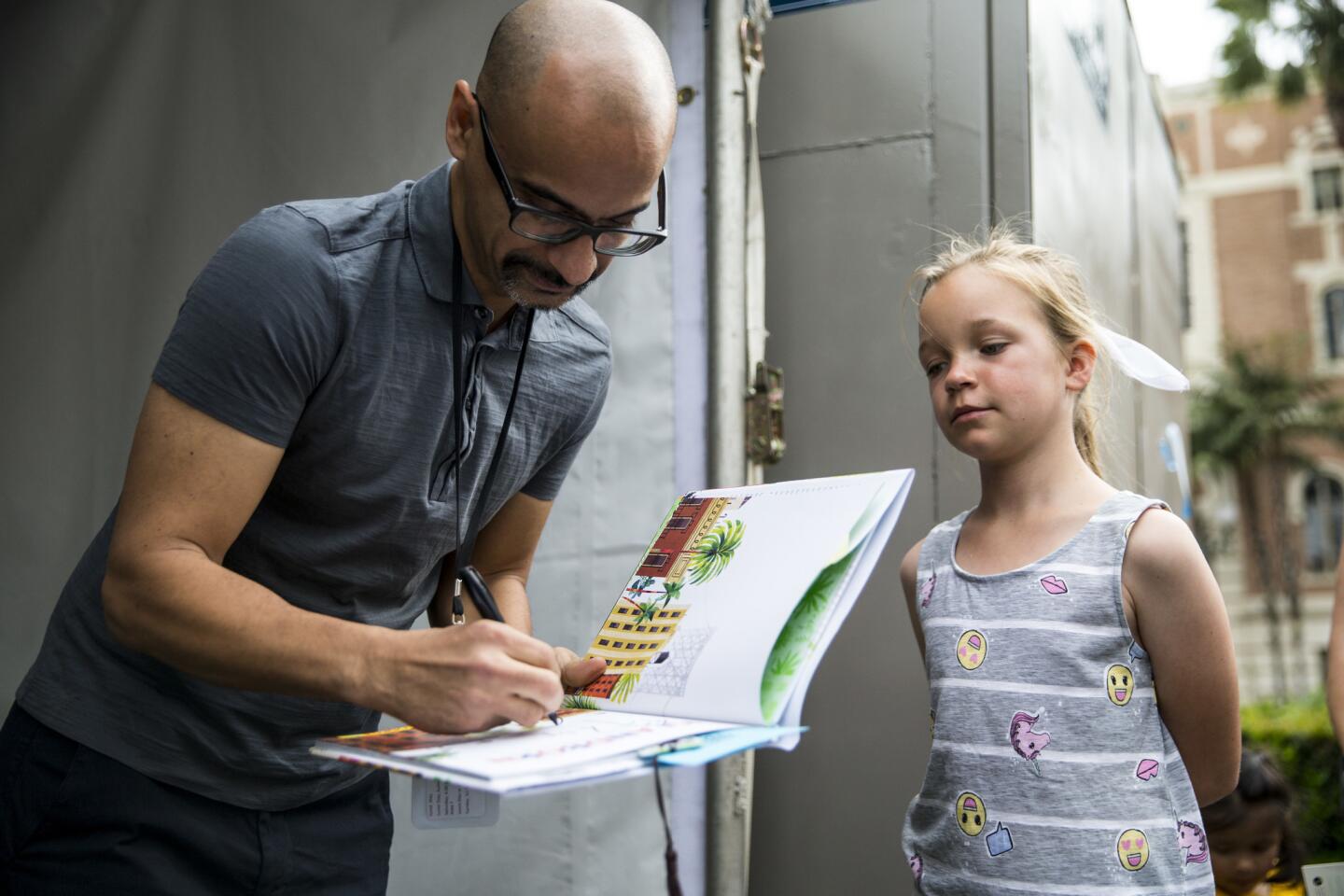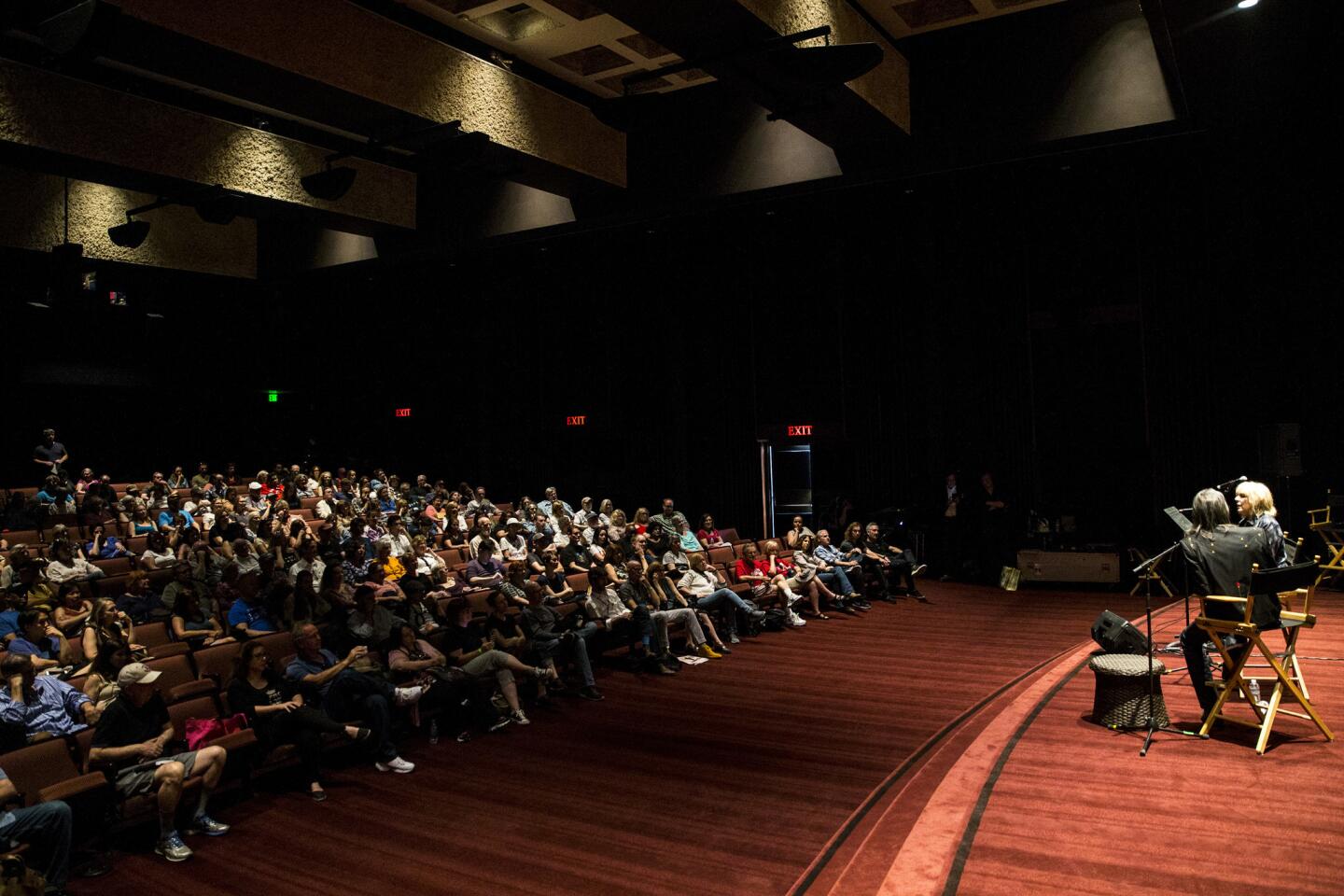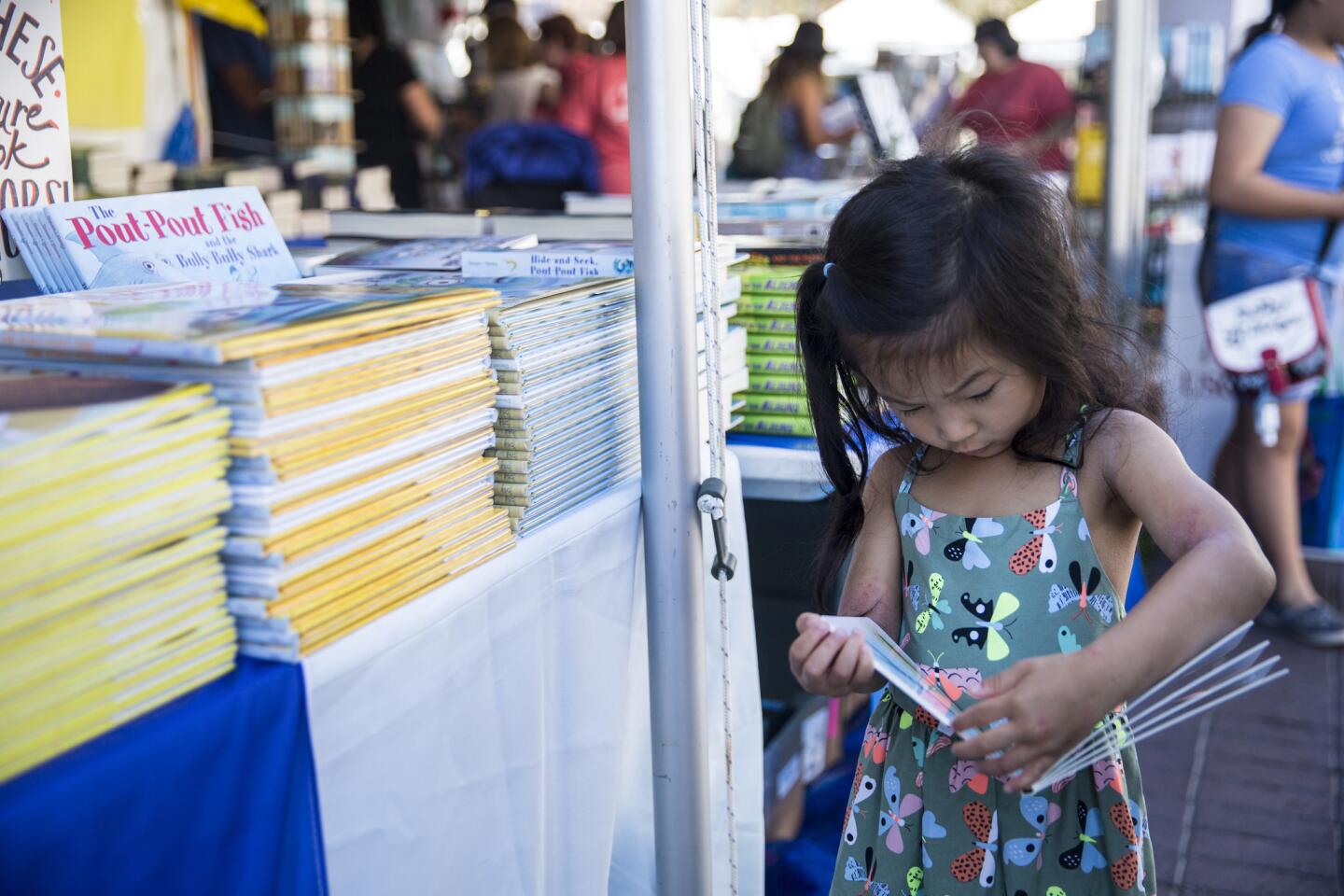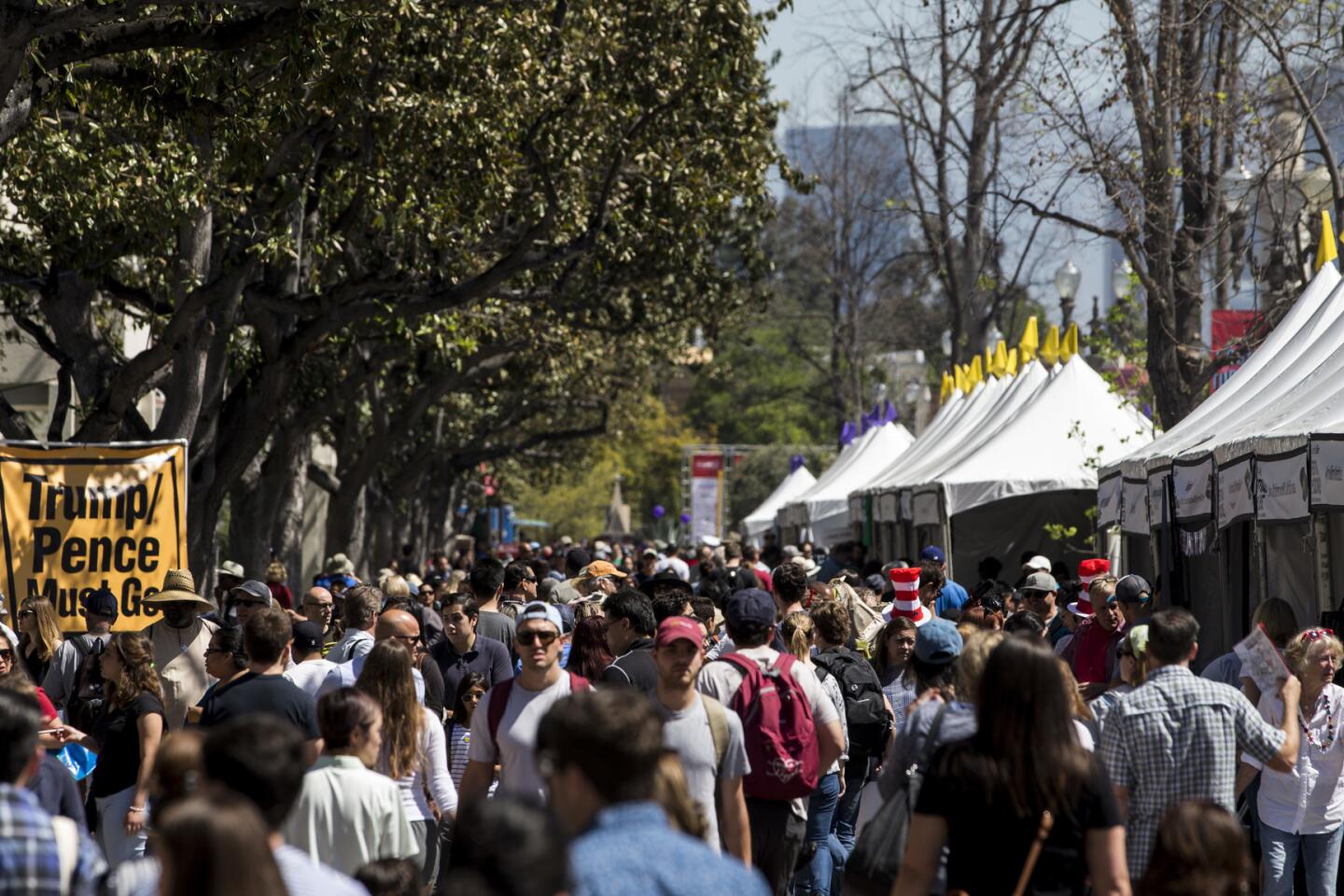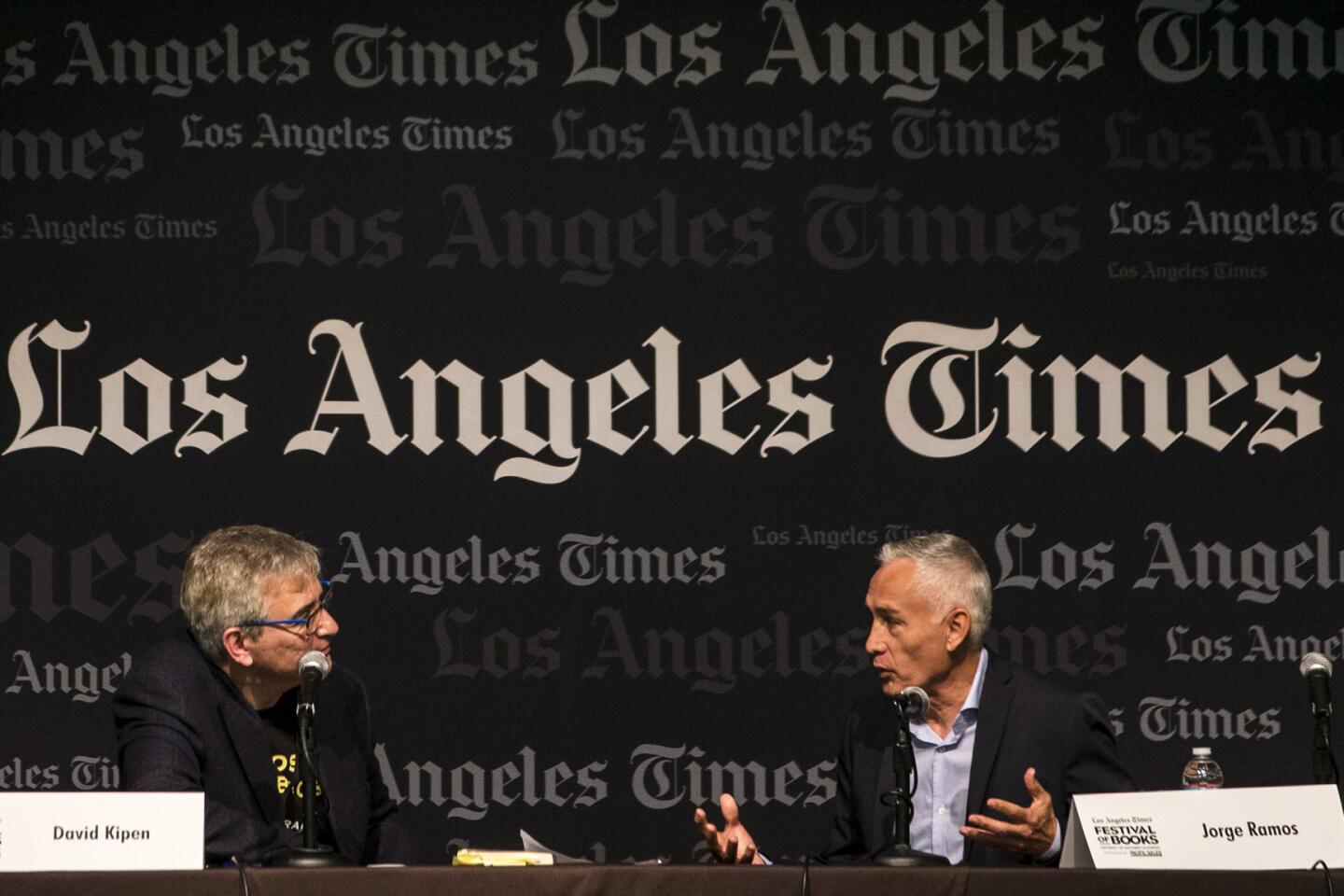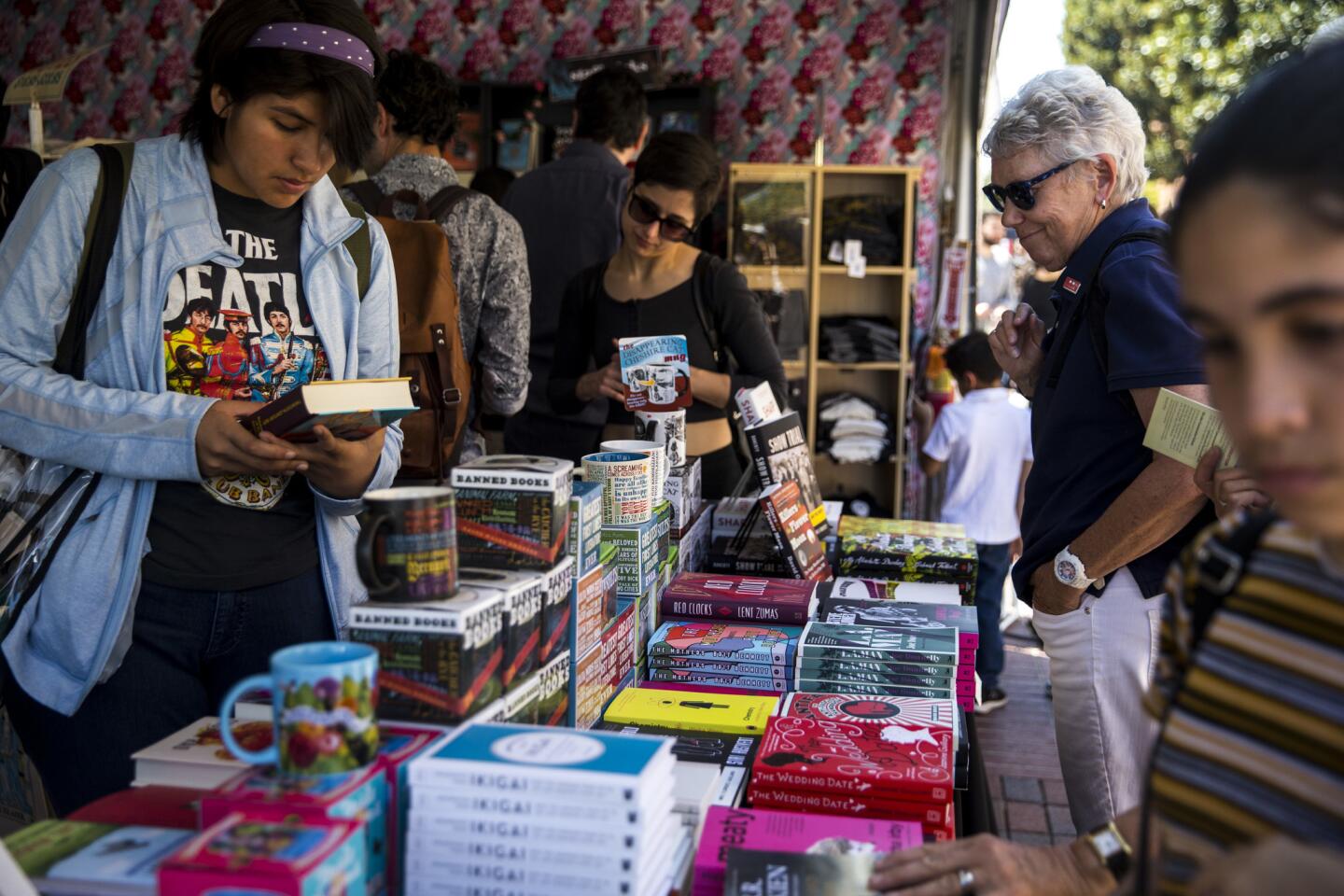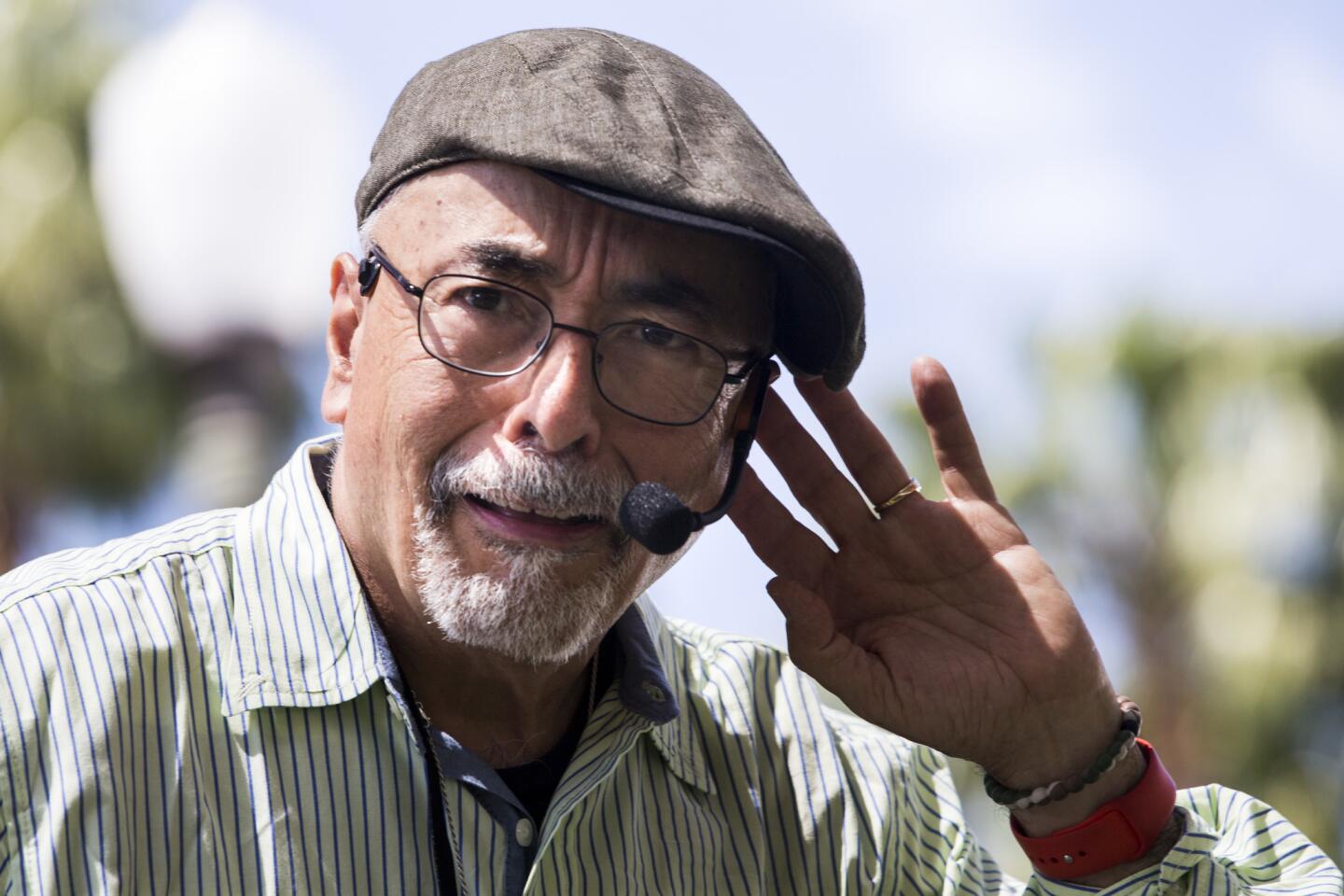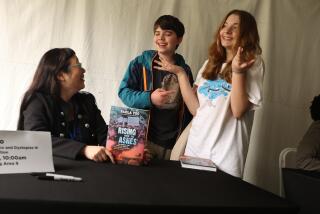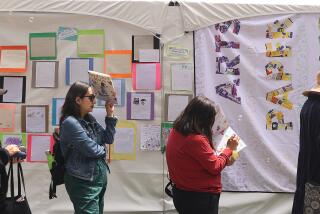Junot Díaz thanked the packed crowd and its city. “When fools talk about diversity,” he said, “they can’t even imagine L.A.”
The auditorium roared. A smile cracked the author’s face.
The Pulitzer Prize-winning novelist, a headliner of this year’s Los Angeles Times Festival of Books, made the comments Sunday during a public discussion on the second and final day of the event.
Now in its 23rd year, the book festival — the largest in the U.S. — featured workshops, readings and panel discussions with authors, journalists and prominent legal minds. The event, which drew an estimated 150,000 people to USC, included sessions on Mexican food, creative activism and how to stand out as an author of young adult fiction.
On Sunday, Times staff writers led panel discussions on writing about sexual harassment in the #MeToo era and covering the cannabis industry.
1/31
Aurora Carrillo-Vincent, 5, and Matthew Carrillo-Vincent, 35, read together during the Los Angeles Times Festival of Books at USC on Sunday.
(Kent Nishimura / Los Angeles Times) 2/31
Chris Homandberg, 35, of Los Angeles chats while holding 11 books he plans to buy at the Los Angeles Times Festival of Books at USC on Sunday.
(Kent Nishimura / Los Angeles Times) 3/31
People seek out shade while reading comics during the Los Angeles Times Festival of Books at USC on Sunday.
(Kent Nishimura / Los Angeles Times) 4/31
Chris “The Glove” Taylor speaks during the “Hip-Hop as Storytelling” discussion with West Coast music pioneers during the Los Angeles Times Festival of Books at USC on Sunday.
(Kent Nishimura / Los Angeles Times) 5/31
Chris Homandberg, center, 35, of Los Angeles navigates the crowd at a book-sellers tent during the Los Angeles Times Festival of Books at USC on Sunday.
(Kent Nishimura / Los Angeles Times) 6/31
Jason Ham, 23, of Los Angeles rests his head on Baily Pham’s legs while they read books during the Los Angeles Times Festival of Books at USC on Sunday.
(Kent Nishimura / Los Angeles Times) 7/31
Author Dave Eggers, left, talks with Joel Arquillos, executive director of the nonprofit group 826LA, at the Bovard Auditorium during the Los Angeles Times Festival of Books at USC on Sunday.
(Kent Nishimura / Los Angeles Times) 8/31
Leslie Odom Jr., “Hamilton” star and author of “Failing Up: How to take Risks, Aim Higher, and Never Stop Learning,” speaks during the Los Angeles Times Festival of Books at USC on Sunday.
(Kent Nishimura / Los Angeles Times) 9/31
The USC Trojan Marching Band performs at the USC Stage during the Los Angeles Times Festival of Books at USC on Sunday.
(Kent Nishimura / Los Angeles Times) 10/31
People gather and listen as the USC Trojan Marching Band performs at the Los Angeles Times Festival of Books at USC on Sunday.
(Kent Nishimura / Los Angeles Times) 11/31
Actor and blogger Wil Wheaton, left, speaks with science fiction author John Scalzi during the Los Angeles Times Festival of Books at USC on Sunday.
(Kent Nishimura / Los Angeles Times) 12/31
A packed crowd attends actor-blogger Wil Wheaton’s talk with science fiction author John Scalzi during the Los Angeles Times Festival of Books.
(Kent Nishimura / Los Angeles Times) 13/31
“Islandborn” author Junot Díaz speaks at the Bovard Auditorium during the Los Angeles Times Festival of Books at USC on Sunday.
(Kent Nishimura / Los Angeles Times) 14/31
People walk along Hellman Way during the Los Angeles Times Festival of Books at USC on Sunday.
(Kent Nishimura / Los Angeles Times) 15/31
Austin Peay, 20, of Laguna Niguel, reads “A Higher Loyalty” beneath the shade of trees at the USC alumni park.
(Kent Nishimura / Los Angeles Times) 16/31
Amy Hu, 9, and Adix Hu, 12, read on a grassy knoll while their father Xiao Hu naps during the Los Angeles Times Festival of Books.
(Kent Nishimura / Los Angeles Times) 17/31
Christine Vazquez, 17, of Whittier, makes a postcard to put on a display wall during the Los Angeles Times Festival of Books.
(Kent Nishimura / Los Angeles Times) 18/31
Author Junot Díaz signs a copy of his book, “Islandborn,” for Riley Smith, 10, of Hesperia at the Reading by 9 Children’s stage during the Los Angeles Times Festival of Books.
(Kent Nishimura / Los Angeles Times) 19/31
Grammy Award-winning singer-songwriter Lucinda Williams talks with Scott Goldman, executive director of the Grammy Museum, at the Eileen Norris Cinema Theatre Complex at USC during the Los Angeles Times Festival of Books.
(Kent Nishimura / Los Angeles Times) 20/31
“Down the River Unto the Sea” author Walter Mosley visits the Ronald Tutor Campus Center during the Los Angeles Times Festival of Books.
(Kent Nishimura / Los Angeles Times) 21/31
Maya Chen, 4, looks at a book during the first day of the annual Los Angeles Times Festival of Books.
(Kent Nishimura / Los Angeles Times) 22/31
People pack the walkways at USC during the Los Angeles Times Festival of Books on Saturday, April 21, 2018.
(Kent Nishimura / Los Angeles Times) 23/31
Linda Arkin, 75, of Valencia, looks over the Festival of Books section of the Los Angeles Times on Saturday, April 21, 2018.
(Kent Nishimura / Los Angeles Times) 24/31
Journalists David Kipen, left, and Jorge Ramos speak on a panel during the annual Los Angeles Times Festival of Books on Saturday, April 21, 2018.
(Kent Nishimura / Los Angeles Times) 25/31
Attendees write on the “What book changed your life?” wall during the annual Los Angeles Times Festival of Books.
(Kent Nishimura / Los Angeles Times) 26/31
Esmeralda Oieda, 15, of Bakersfield, looks at books during the annual Los Angeles Times Festival of Books.
(Kent Nishimura / Los Angeles Times) 27/31
People browse books for sale during the annual Los Angeles Times Festival of Books at USC on Saturday.
(Kent Nishimura / Los Angeles Times) 28/31
Nobel Poet Juan Felipe Herrera, author of “Jabberwalking,” talks at the Reading By 9 Children’s stage.
(Kent Nishimura / Los Angeles Times) 29/31
Austin Peay, 20, of Laguna Niguel, reads “A Higher Loyalty” beneath the shade of trees.
(Kent Nishimura / Los Angeles Times) 30/31
Elisa Sifuentes, 16, and Kaitlyn Bin, 16, browse displays of books Saturday on the USC campus.
(Kent Nishimura / Los Angeles Times) 31/31
Nobel Poet Juan Felipe Herrera, author of “Jabberwalking,” is among the featured speakers during the Los Angeles Times Festival of Books.
(Kent Nishimura / Los Angeles Times) During his conversation with Times staff writer Carolina A. Miranda, Díaz — whose family emigrated from the Dominican Republic to New Jersey when he was 6 — spoke about identity, representation and his new children’s book, “Islandborn,” which tells the story of an Afro Caribbean girl named Lola.
His godchildren first asked him to write a children’s book years ago, Díaz said, noting that the process took a long time, as he struggled not to write something cute or corny. Children understand and deserve complexity, he said. They can handle more than narratives of innocence.
“Children are incredibly resilient,” he said. “They know that there are monsters, for real.”
Díaz, who won the Pulitzer Prize in 2008 for his novel “The Brief Wondrous Life of Oscar Wao,” spoke about the importance of representation in literature. Many depictions of Afro Caribbeans “are beyond discouraging,” he said, noting that he was very particular in picking a collaborator to illustrate his book.
“White supremacy has been incredibly malignant,” he said. “I needed an artist who grew up in a black hair salon.”
During the conversation, Díaz alluded to a personal essay he wrote for the New Yorker this month. In the piece, he discusses being raped at age 8 and how the violation seeped into every part, and every phase, of his life.
“Trauma,” Díaz wrote, “is stronger than any mask; it can’t be buried and it can’t be killed. It’s the revenant that won’t stop, the ghost that’s always coming for you.”
During his “Islandborn” tour, the author met so many children who seemed so deeply loved. He couldn’t help but think of his past.
“I had one of those childhoods you don’t want to give to children,” he said, adding that the tour provoked him to write the New Yorker piece.
Throughout the talk, Díaz — a self-proclaimed nerd with a habit of rubbing his palm against his right knee as he speaks — engaged the crowd.
“Any Dominicans in here?” he asked, drawing loud whoops.
“We everywhere,” the author said, smiling.
Sandra Valle, a 38-year-old who works in education, said she was inspired by Díaz’s unapologetic style, particularly his reference to white supremacy during his talk.
“He’s not sidestepping it,” she said. “It’s not extra, it just is.”
For Hugo Fernandez, a Cal State Long Beach student working on a children’s book, one of Díaz’s messages — don’t lose faith — resonated. So far, he’d failed at that task, Fernandez said. But now he’s eager to dig into edits.
While Díaz’s talk touched on many themes, some of the event’s sessions were very specific. There was one on the power of music as medicine and another on the evolution of Mexican food in L.A.
During the panel on Mexican food, chef Wes Avila of Guerrilla Tacos spoke about the importance of a good tortilla. Instead of using ingredients from massive corporations — “big, huge conglomerate corn,” he called it — he buys from a local organic tortilleria, Kernel of Truth Organics.
“You can taste the difference,” Avila said.
marisa.gerber@latimes.com
For more news from the Los Angeles County courts, follow me on Twitter: @marisagerber
